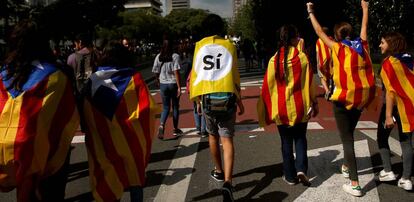Russia uses Catalan referendum in fight against Brussels
State-funded media outlets use the crisis in Spain as proof of the failure of the European project

Russia’s official media speak about Catalonia, but they are really shooting at Brussels, using the referendum as ammunition. From the channels of the state broadcaster, which is the main source of news for most Russians, the Catalan referendum is presented as one of the many problems overwhelming Europe, and also as a proof of the ineffectiveness and failure of the European project, and by extension, of all Western projects.
This media coverage is part of a trend that started in 2013, and treats Europe as a systematically unstable environment, with serious social difficulties and corrupt leaders. With different nuances and intensities, depending on the circumstances, this attitude has been applied to issues such as Ukraine, the French and German elections, Brexit, and immigration.
The referendum is being used to weaken the EU by capitalizing on its members’ issues
Catalonia falls into this context, and coverage of the referendum is neither as intense or as aggressive as the campaign against Hillary Clinton was during the US elections. The referendum is more of a link in a wider strategy to weaken the EU by capitalizing on its members’ issues.
The goal is to bring about an end to the sanctions imposed on Moscow because of its annexation of Crimea in March 2014 and its intervention in Eastern Ukraine that same year.
“Putin understands that by supporting far-right movements, nationalists, and separatists, as in Catalonia for example, it weakens and destroys the unity of Europe, which is what maintains the sanctions against Russia,” said Alexei Venediktov, director of the radio station Echo of Moscow. Putin “needs to break the unity of Europe,” said the influential journalist. This is “self-evident” and “unrelated to ideology,” Venedikov said, noting that the Russian leader will support anyone who is useful to him, regardless of ideology.
The difference is that the referendum in Scotland was legitimate from the beginning Nikolai Topornín, European law professor
The Russian television coverage uses mental associations such as comparing the Civil Guard deployment in Catalonia to the situation under Francisco Franco, the former dictator of Spain, but it doesn’t usually fully develop the association. The Russia 24 channel has referred to the pro-independence demonstrations as a “color revolution” within the EU.
Comparisons in the independent press are typically more nuanced. The newspaper Nóvaya Gazeta, a critic of Kremlin politics, compares Crimea and Catalonia for the benefit of the latter and emphasizes that the Russian language was not respected in Ukraine, unlike in Catalonia. In both cases, they assert, the referendums are “illegal.”
“The referendum in Catalonia: a challenge for Spain and the European Union?” The official news agency Ria-Novosti organized a discussion panel on Friday based on that idea. The moderator tried to keep the speakers within the framework of official Russian policy, out of respect for the territorial integrity of Spain, and to avoid comparisons with Crimea that he described as “incorrect.”
Moscow officially supports Spain’s territorial integrity, but it did the same for Ukraine in the past
However, Nikolai Platoshkin, a professor at the Moscow University for the Humanities, insisted that Russia “should take a position” on Catalonia similar to what it took with the referendum in Scotland, of respecting the outcome. “The difference is that the referendum in Scotland was legitimate from the beginning,” retorted European law professor Nikolai Topornín, according to whom “the vote will have no legal consequences and make dialogue difficult.”
Topornin rejected the parallels with Brexit. “The Catalans do not want to leave the EU, but instead use it to their advantages,” he said. “Europe is a quilt and Catalonia is not a unique case,” said Alexei Martinov, director of the Institute For New States think tank. A journalist with Izvestia newspaper, Martínov referred to the “Ukrainization of the EU” and predicted the application of “martial law.”
On Wednesday, Spanish ambassador Ignacio Ibáñez met with Russian journalists from Interfax. “All the statements issued by the Russian government are perfect from our point of view,” said the diplomat. In fact, according to Foreign Minister Sergey Lavrov, and the Kremlin spokesman, Dmitri Peskov, Moscow supports the territorial integrity of Spain.
However, Russia’s official position may not always be the full story. Events in Ukraine illustrated that a guarantee of territorial integrity “issued” by Moscow in the past may no longer be valid in the present or the future. The Russian political machinery in places affected by separatist tendencies could be compared to an iceberg: the visible part (the official position held by the Foreign Ministry or the Kremlin) has another, submerged area that is always ready to move in the direction that the Kremlin indicates.
English version by Debora Almeida.
Tu suscripción se está usando en otro dispositivo
¿Quieres añadir otro usuario a tu suscripción?
Si continúas leyendo en este dispositivo, no se podrá leer en el otro.
FlechaTu suscripción se está usando en otro dispositivo y solo puedes acceder a EL PAÍS desde un dispositivo a la vez.
Si quieres compartir tu cuenta, cambia tu suscripción a la modalidad Premium, así podrás añadir otro usuario. Cada uno accederá con su propia cuenta de email, lo que os permitirá personalizar vuestra experiencia en EL PAÍS.
¿Tienes una suscripción de empresa? Accede aquí para contratar más cuentas.
En el caso de no saber quién está usando tu cuenta, te recomendamos cambiar tu contraseña aquí.
Si decides continuar compartiendo tu cuenta, este mensaje se mostrará en tu dispositivo y en el de la otra persona que está usando tu cuenta de forma indefinida, afectando a tu experiencia de lectura. Puedes consultar aquí los términos y condiciones de la suscripción digital.









































